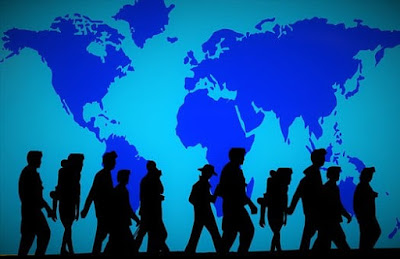India is the mother of democracy
India is the Mother of Democracy
Democracy is one of the most important political systems in the world, allowing people to have a say in their government and the decisions that affect their lives. In today's world, democracy is more important than ever, as people seek to have greater control over their own lives and to hold their leaders accountable for their actions.
India, known as the world's largest democracy, has played a vital role in spreading democratic values and principles around the world. India has been successful in creating a vibrant democratic culture and institutions, which have inspired other countries to embrace democracy as well.
Democracy in India:
India has a rich history of democracy that dates back to ancient times. In ancient times and The concept of democratic governance was present in the Mauryan Empire, which ruled India from 322 BCE to 185 BCE. In modern times, India adopted a democratic form of government after gaining independence from British colonial rule in 1947. Since then, India has become a thriving democracy, with a vibrant political culture, a free and independent media, and an active civil society.
India's democracy is based on a parliamentary system, where citizens elect representatives to the legislative body, which in turn elects the Prime Minister as the head of government. India has a multi-party system, with over 60 political parties registered with the Election Commission of India. Elections are held every five years, and the participation of citizens is high, with voter turnout often exceeding 70%.
India's democracy is not without its challenges, however. Corruption, political violence, and religious and caste-based divisions are some of the issues that the country continues to grapple with. Nevertheless, India's democratic institutions have remained resilient, and the country's commitment to democratic values remains strong.
India's role in spreading democracy:
India's success as a democracy has inspired other countries around the world to embrace democratic principles and practices. India has been an active participant in international efforts to promote democracy and has played a leading role in the Non-Aligned Movement, a group of countries that promotes international cooperation and peaceful coexistence.
India has also been a vocal advocate for democracy at the United Nations, where it has championed the cause of democratic governance and human rights. In recent years, India has been involved in supporting democratic transitions in countries such as Afghanistan, Bhutan, and Nepal.
India's democracy has also served as a model for other countries in the region. Countries such as Bangladesh, Sri Lanka, and Maldives have all adopted similar democratic systems, with varying degrees of success. India's success as a democracy has also helped to counter the argument that democratic governance is incompatible with the cultural and religious traditions of South Asia.
India's democratic institutions have also played a crucial role in ensuring stability and peace in the region. India's democratic system has helped to prevent the kind of political instability and conflict that has plagued other countries in the region, such as Pakistan and Bangladesh.
Democracy in today's world:
Despite the successes of democratic governance in India and other countries, democracy is facing significant challenges around the world. In recent years, there has been a rise in authoritarianism, populism, and nationalism in many countries, which has threatened the stability of democratic institutions and undermined the rule of law.
In countries such as Hungary, Israel, Poland, and Turkey, leaders have sought to erode the independence of the judiciary, the media, and civil society, and to curtail the rights of minorities and opposition groups. In other countries, such as Venezuela and Nicaragua, authoritarian leaders have used violence and intimidation to silence dissent and maintain their grip on power.
The rise of social media and the spread of misinformation have also had a significant impact on democratic governance. Social media platforms have been used to spread false information, to polarize public opinion, and to undermine the legitimacy of democratic institutions.
Conclusion:
Democracy remains one of the most important political systems in the world, allowing people to have a say in their government and to hold their leaders accountable for their actions. India, as the world's largest democracy, has played a vital role in spreading democratic values and principles around the world.
Despite the challenges facing democratic governance today, it is important to remember the successes of democratic institutions in India and other countries. Democracy has helped to ensure stability, peace, and prosperity in many parts of the world, and it remains the best system for ensuring that people have a say in the decisions that affect their lives.
As citizens, it is our responsibility to protect and defend our democratic institutions, to hold our leaders accountable, and to ensure that our voices are heard. By doing so, we can help to strengthen democracy and ensure that it continues to thrive in today's world.
Jay Hind



.jpg)

Comments
Post a Comment